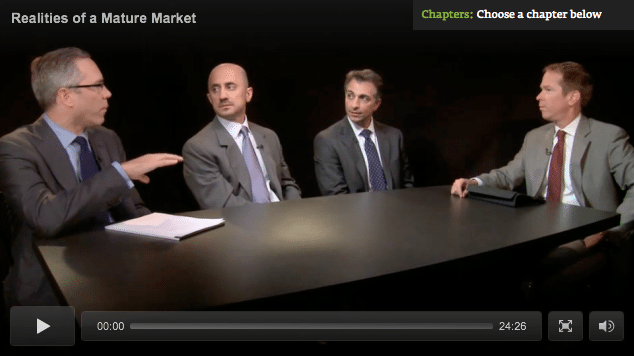The Last Days of Deal Fees
DEALS FEES WERE ONCE A TIDY PROFIT CENTER FOR private equity firms. General partners could charge their portfolio companies for advisory, “monitoring” and transaction services, and keep a large chunk of that income for themselves—without sharing the proceeds with the limited partners.
But those days are long gone, and they are probably never coming back. Of course, most GPs continue to collect fees from portfolio companies, but today LPs are demanding that GPs turn over as much as 100 percent of the income, or use the proceeds to offset management fees. And given the fundraising climate, private equity firms have little choice but to comply with these demands.
Deals fees have long been a bone of contention between GPs and LPs. The issue first started to heat up in the mid 1990s when Kohlberg Kravis Roberts was struggling with its $25 billion buyout of RJR Nabisco. At that time, KKR had held RJR Nabisco for about six or seven years, and, according to an investment adviser who worked with KKR’s LPs at the time, it was looking more and more likely the landmark deal would end up a money loser for KKR’s investors—but not necessarily for KKR itself.
The divergent fortunes were related to KKR’s having collected roughly $100 million in deal fees, including consulting fees and board management fees, which went directly into its coffers. “It really floored a lot of LPs that they could be in a position to lose money while the GPs were still making a killing off these fees,” explains the advisor. “That’s when it became an alignment of interest issue.”
Over the intervening years, LPs managed to claw their way to a 50-50 split when it came to deal fees. And that’s generally where things stood until the Great Recession hit in 2008. “LPs started pushing hard on this during the financial crisis because it was a situation where, with so many companies underwater, they were losing money,” says the advisor. “Yet GPs were in a position where they could be making money just from deal fees. Limited partners were determined that these fees no longer remain an area of profitability for the GPs.”
The deal fee issue became a kind of rally cry for limited partners. In September of 2009, the Institutional Limited Partners Association (ILPA) issued a set of guidelines aimed at keeping general partners in line. Near the top of the list: a call for GPs to hand back 100 percent of deal fees.
“The ILPA principles reflect a concerted effort by the limited partners to move the needle and encourage greater fee sharing,” says Michael Harrell, a partner at law firm Debevoise & Plimpton LLP. “They have very much succeeded in doing that. I would say of the many pro-LP changes that ILPA pushed for, deal fees is the one term where they convinced almost every GP to go along.”
Today, most GPs are willing to offer at least 80 percent and more often 100 percent. And if they don’t? “LPs will throw you in the waste basket before going any further,” notes Harrell.
But is it fair that GPs not be allowed to make money off their transaction and monitoring services? After all, they spend a great deal of time trying to improve their portfolio companies and helping them in all sorts of ways. Isn’t their time and effort worth something?
For the most part, LPs aren’t buying this sob story. There is, however, one exception: smaller funds that typically manage $400 million or less. Because of the high level of fixed costs like office real estate, it is harder for smaller funds to generate the higher financial incentives to keep junior staff on board. These smaller firms rely on deal fees to generate income for compensation.
The same argument is not working for larger funds because of the substantial income they already generate from the roughly percent management fee they charge investors.
If they can’t make any money off deal fees, some firms have decided to do away with them altogether. Warburg Pincus does not charge them because it believes portfolio companies don’t like to be nickel-and-dimed by their private equity firms. “It’s been part of our pitch to inves- tors that we don’t do deal fees,” Joseph Landy, co-president of Warburg Pincus, recently told The Economist.
Deal-fee abolition clearly pleases LPs. Private equity giant Apax Partners has reportedly done away with deal fees as it attempts to raise its new mega-fund. Additionally, Yellow Wood, a new fund with $225 million under management, has publically stated it will not charge any deal fees because it does not want to place any extra burden on its portfolio companies.
But news of the demise of deal fees may be exaggerated. A 2011 joint investigation by law firm Dechert LLP and private equity research firm Preqin found that while fee activity dropped immediately following the financial crisis, it has since rebounded across all deal sizes, in many cases to levels higher than those in the era prior to the market crash.
But this time it’s the LPs who are reaping the rewards. “I think this reflects a shift in the balance of power be- tween GPs and LPs,” says Harrell. “LPs are focused very hard on fees and they are being relentless about it.
Does this mean the deal fees are effectively dead for GPs? Or, once the market gets hot again, can they realistically expect the pendulum to swing back in their favor, allowing them to keep more deal fees for themselves? Not likely. Once LPs gain ground, they don’t easily give it up. “What generally happens in this market is that you never go back to the way things were,” says Harrell.
A once-important source of wealth creation for GPs is being hunted to extinction by LPs
Register now to read this article and access all content.
It's FREE!
Privcap Email Updates
Subscribe to receive email notifications whenever new talks are published.
